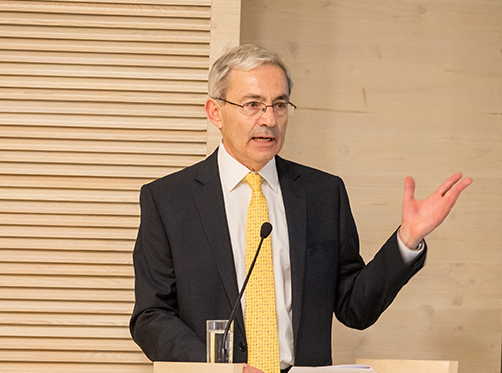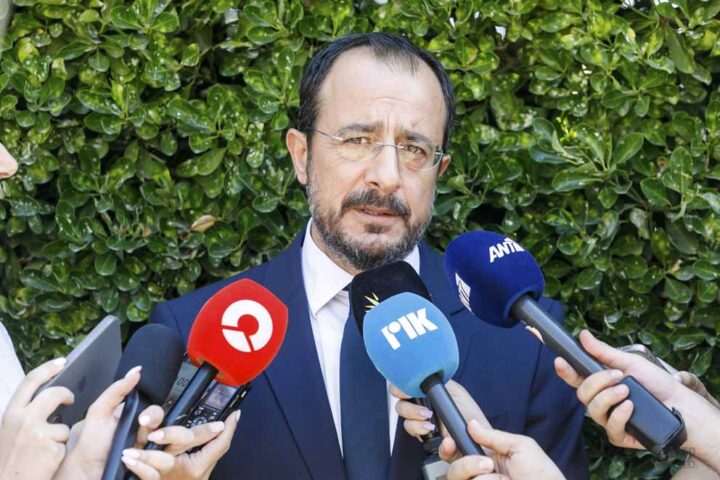Sir Christopher Pissarides, a Nobel prize-winning economist, has joined the EuroAfrica project to build a 1,000MW Egypt-Cyprus electricity interconnector scheduled to be operational by end 2023.
The 2010 Nobel laureate and Professor of Economics at the London School of Economics was appointed Chairman of the Economic Council of EuroAfrica Interconnector.
Thursday’s announcement comes as Cyprus-Egypt energy relations are flourishing, as both countries explore closer natural gas cooperation while Cairo turns to export its excess electricity output to Europe through the 498km cable link to Cyprus.
Former Cyprus foreign minister and Chairman of the EuroAfrica Strategic Council, Ioannis Kasoulides, welcomed Pissarides’ appointment.
“We are building bridges between continents, as Egypt’s electricity grid will be connected to Europe, through Cyprus, and Egypt becomes a major energy hub for the Arab World and Africa.”
“It is a great honour for us that we welcome a distinguished economist and highly respected academic such as Dr Pissarides, contributing his knowledge and extensive wisdom,” Kasoulides added.
Pissarides, universally acknowledged for his contribution in economics, was picked by Prime Minister Kyriakos Mitsotakis in February to chair the committee tasked with the long-term growth strategy for Greece.
The EuroAfrica Interconnector will be commissioned in December 2023 and through an investment of €1 bln will contribute significant social and economic benefits for all the countries involved.
With an initial capacity of 1,000 MW in Stage 1, the interconnector will also contribute to the monetisation of Egypt’s vast energy resources, mainly from renewables and recent discoveries of hydrocarbon deposits.
The EuroAfrica Interconnector has been dubbed an ‘electricity highway’ which interconnects Egypt with Europe, through Cyprus, and creates an energy hub for Africa and the Arab world.
Realising a need to boost earnings from its vast energy output, Egypt has begun talks over plans to sell electricity to Europe and Africa, pressing its advantage as a producer of cheap renewable energy in a bid to become a regional export hub, Bloomberg reported this week.
Ayman Soliman, the head of its sovereign wealth fund, said that Egypt, which has a surplus of electricity, sees unspecified “power-hungry” countries to the north and Europe as possible customers, via the sub-sea cable to Cyprus and Greece.
“We are in talks with European infrastructure investors, advisers and energy traders to assess the viability and appetite,” the wealth fund CEO said in an interview with Bloomberg.
“The interconnector “will position Egypt as a long-term renewable supply hub for Europe.”
Regional energy hub
Electricity exports could be a lucrative earner for Egypt, which is already becoming a natural-gas hub after offshore discoveries.
The North African nation, which has a capacity of about 50 gigawatts — a fifth of that excess — has long-used gas-fired plants and hydropower and is boosting the use of other sources.
Around 8.6% of the country’s power comes from renewables, and it’s targeting 20% by 2022 and more than doubling that by 2035.
Egypt’s capacity has been bolstered in recent years by three power plants co-built by Siemens AG, a $4 bln solar park in the south, Benban — one of the world’s biggest — and a wind farm.
The country also signed a $30 bln deal with Russia in 2017 to build North Africa’s first nuclear power plant, with a capacity of 4.8 gigawatts.
The first stage of the Egypt-Cyprus-Greece interconnector is estimated to cost €2.5 bln and scheduled for commissioning by December 2023 with an initial transmission capacity of 1,000 megawatts.
Egypt will benefit from the low cost of power production, especially for solar, according to Soliman.
A profitable selling price for power from Benban is 2.4 cents per kilowatt-hour, compared to the average price paid per European household of 23 U.S. cents per KWh, he told Bloomberg.
In the industrial sector, he cited a profitable selling price for Egypt of about 9 cents per kWh versus as much as 15.4 cents in nations like Germany and Italy.
The Egyptian newspaper Al Watan said the Ministry of Electricity and Renewable Energy started implementing the first steps to transform Egypt into an energy hub by launching the current in the first phase of a 70MW electrical interconnection project with Sudan which is expected to reach 3,000 megawatts.
Cairo has laid down its objectives in electrical interconnection projects which include transforming Egypt into an important point for the transmission of electricity to Europe and Africa through electricity interconnectors by 2030.
The Al Watan report said the Ministry of Electricity is currently evaluating studies for the electricity link with Cyprus, concluding that Egypt, Cyprus and Greece have a great interest in completing the project in time, through a 400 kV submarine DC cable, with a second phase capacity of 2000MW.
The EuroAfrica Interconnector has secured all building permits for the converter station in Cyprus which will be built by Siemens AG, a leading player in energy production and electricity transmission projects.










